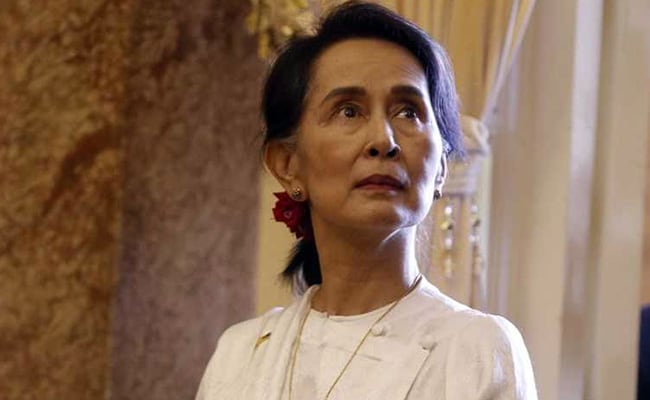Myanmar’s deposed leader Aung San Suu Kyi was hit with another charge on Tuesday, after the military imposed a second straight overnight internet shutdown in an attempt to grind down an anti-coup uprising.
In the two weeks since the generals ousted Suu Kyi and put the civilian leader under house arrest in the administrative capital Naypyidaw, big cities and isolated village communities alike have been in open revolt.
The military justified its power seizure by alleging widespread voter fraud in November elections that Suu Kyi’s party won.
After her detention in a dawn raid on February 1 — the day of the coup — she was charged under an obscure import and export law, over walkie talkies that were found in her home during a search.
The Nobel laureate’s lawyer told AFP Tuesday she had been hit with a second charge, of violating the country’s disaster management law.
“She was charged under section 8 of the Export and Import law and section 25 of the Natural Disaster Management law as well,” Khin Maung Zaw told AFP.
While it was unclear how the disaster law applied in Suu Kyi’s case, it has been used against deposed president Win Myint — also arrested on February 1 — relating to a campaign event that the junta alleges broke coronavirus-related restrictions.
Khin Maung Zaw added that Suu Kyi and Win Myint, both of whom he has yet to have any contact with, were expected to appear via video conference during a March 1 trial.
Both defendants were in a “safer place” and “in good health”, according to military spokesman Zaw Min Tun.
“It’s not like they were arrested — they are staying at their houses,” the general, who became the country’s vice-minister of information after the coup, said during a press conference Tuesday.
More than 420 people have been arrested since the coup, according to a list of confirmed detentions from the Assistance Association for Political Prisoners monitoring group. There are numerous unconfirmed reports of other arrests.
“We didn’t sleep the whole night”
Security forces have used increasing force to quell huge nationwide street protests and a disobedience campaign encouraging civil servants to strike.
Troops have fanned out around the country in recent days.
They fired rubber bullets to disperse one rally in Mandalay, Myanmar’s second-largest city, hours before authorities again cut internet access.
“They shut down the internet because they want to do bad things,” said 44-year-old Win Tun, a resident of commercial capital Yangon.
“We didn’t sleep the whole night so we could see what would happen.”
The internet blackout came after another day of protests in Yangon and Mandalay, where police used slingshots against protesters and fired rubber bullets into the crowd. At least six were injured in the clashes.
Crowds returned to the streets of Yangon and around the country on Tuesday morning.
“I want more people to join the protests, we don’t want to be seen as weak,” said university student Thwe Ei Sann.
A large crowd blocked railway tracks outside Mawlamyine to prevent a Yangon-bound train from leaving the port city.
Many of the country’s train drivers have joined the anti-coup work boycotts, frustrating junta efforts to restart the national railway network after a Covid-19 shutdown.
Yangon residents at the weekend used tree trunks to block police vehicles sent to take striking rail workers back to their stations.
“Nobody believes them”
The international community has unleashed a torrent of condemnation against the leaders of Myanmar’s new military administration, which insists it took power lawfully.
UN ambassador Christine Schraner Burgener spoke to junta number two Soe Win on Monday and warned him that the regime’s network blackouts “undermine core democratic principles”, according to a spokesman.
State media reported the following day that the general had discussed “security measures” with the envoy, along with the regime’s Covid-19 vaccination rollout and economic recovery plans.
UN special rapporteur Tom Andrews told AFP Monday that he did not expect Suu Kyi’s court hearing to be fair.
“There’s nothing fair about the junta. This is theatre. It’s just theatre,” Andrews said.
“And of course, nobody believes them.”
(Except for the headline, this story has not been edited by NDTV staff and is published from a syndicated feed.)
[ad_2]





